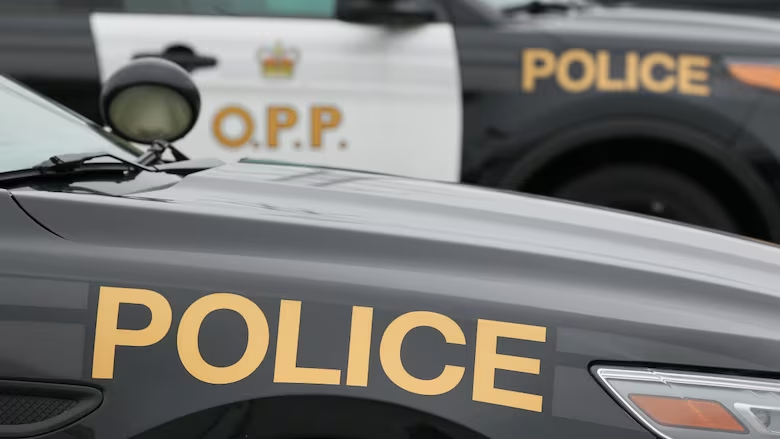Toronto-area drivers stopped by OPP will have to give breath sample
Anti-drunk driving organization praises move, civil liberties group raises Charter concerns

All drivers in the Greater Toronto and Hamilton Area who are pulled over by Ontario Provincial Police highway safety officers will now be asked to provide a breath sample — no matter what they're stopped for.
Officers will be conducting "mandatory alcohol screening" at every routine traffic stop as part of a new enforcement policy taking aim at drinking and driving, even if there is no reason to suspect a driver is impaired, the OPP said this week.
"The OPP have always had officers use their discretion as to when they want to conduct a mandatory alcohol screening as part of their regular patrols and investigations," Sgt. Kerry Schmidt said in an interview.
"Now ... when they stop a driver for any offence or for any investigation, they will also be including a mandatory alcohol screening demand, which is there to ensure the drivers are sober and they're not driving impaired."
The initiative is being praised by the country's leading anti-impaired driving advocacy organization, but is being criticized as unconstitutional by a national civil rights group.
'There is no bias': OPP
It is illegal in Canada for a driver to operate a vehicle if impaired by alcohol, drugs or both. Drivers with a blood alcohol concentration of 0.08 per cent are considered impaired under the Criminal Code and subject to potential charges.
Mandatory alcohol screening isn't new — police officers across the country have had the ability to stop and test any driver for potential alcohol consumption without the need for reasonable suspicion since the federal government passed a law authorizing it in 2018. Under that law, any person who refuses to co-operate with the breathalyzer test could be charged with a criminal offence.

But the OPP says making drivers take a test at every traffic stop will help further deter impaired drivers and make roads safer amid a rising trend of impaired driving collisions and charges.
Schmidt said impaired driving charges are up almost 30 per cent so far this year compared to the average from the previous five years, and that 11,000 impaired driving charges were laid last year compared to 8,800 in 2019. Fifty-one people died in alcohol or drug related crashes last year across the province.
The policy, which is already in place, won't involve an increase in drivers being pulled over, he said. Instead, people stopped for suspected speeding, distracted driving, seatbelt or other infractions will be asked to provide a breath sample as a matter of course.
"There is no bias. Everyone is being tested," Schmidt said. "It's fair for all motorists and there is ... no community or group that should feel that they are being targeted."
The policy will be implemented by officers operating out of OPP detachments in Toronto, Mississauga, Burlington, Cambridge, Aurora, Whitby, Niagara and Highway 407.
The move follows the lead of the RCMP in Saskatchewan, which began administering a breathalyzer test at every traffic stop in their jurisdiction on April 1st.

'Perception of getting caught' can help: advocate
Steve Sullivan, CEO of MADD Canada, said his organization has pushed for an expansion of mandatory alcohol screening for years.
"What impacts whether people decide to drive impaired ... is their perception of getting caught," Sullivan said. "If you think there's a better likelihood police are going to catch you, you'll change your behaviour."
The Department of Justice says research shows up to 50 per cent of drivers with a blood alcohol level above the legal limit may not be detected at roadside check stops. The department says rates of impaired driving and fatal road accidents have been significantly reduced in other countries where mandatory alcohol screening was introduced.
Sullivan said mandatory alcohol checks will help officers detect more drunk drivers.
"Police, just going on suspicion, miss a lot of actual impaired drivers," Sullivan said. "Talking to police officers in other jurisdictions, [they] say, 'When I've used it, I've actually found people who are impaired I would never have suspected in the past.'"
Civil liberties group raises Charter concerns
Shakir Rahim, director of criminal justice for the Canadian Civil Liberties Association, said his organization is "seriously concerned" the expansion violates the Charter of Rights and Freedoms, which protects individuals from unreasonable search and seizure.
"We agree that drunk driving is a serious problem that has to be addressed, but we think that there are more Charter-compliant and still effective ways to do so," Rahim said.
Police could continue use stationary roadside checkpoints where not every motorist that is stopped has to provide a mandatory breath sample, Rahim said.

The CCLA opposed the 2018 federal law when it was introduced, and Rahim said the organization looked at other jurisdictions at the time that had implemented mandatory alcohol screening. It concluded a definitive link between mandatory breath samples a decrease in drunk driving in those jurisdictions couldn't be established because other factors such as education campaigns and increased enforcement also played a role.
"We could live in a society where the police could walk into your apartment at any time and rummage through your belongings or, you know, flag you down on the street and say open your pockets," Rahim said. "Maybe there would be one or two or more crimes that are detected as a result, but that's a society that's not free and democratic."
Rahim said the CCLA will be monitoring any potential court challenges to the 2018 law and will intervene if an "appropriate case" makes it to the Supreme Court of Canada.
With files from Cedric Lizotte

